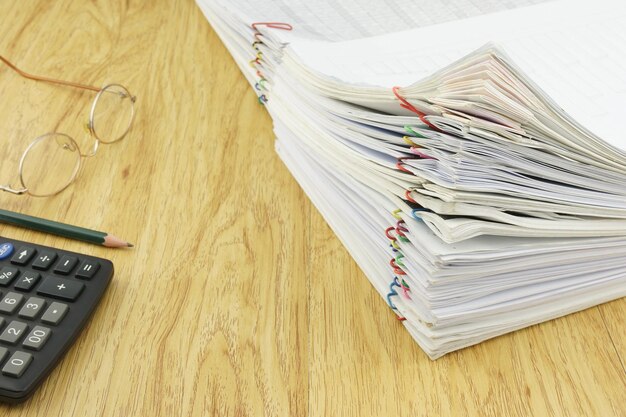How Long Should You Keep Your Tax Returns? A Comprehensive Guide
Sorting through piles of paperwork may not be your idea of a good time, but keeping your tax returns organized can save you headaches down the road. Whether you’re overwhelmed by documents or curious about the rules, knowing what to keep and for how long is key to staying compliant and prepared.
Why Keep Tax Returns?
Tax documents can serve various purposes beyond just tax compliance. Let's explore the key reasons for retaining them.
Proof of Income and Financial Stability
Why it matters: Lenders, landlords, and other entities often require proof of income for loan approvals, rental agreements, or even job applications.
Defense Against Audits
The IRS factor: If the IRS decides to audit you, having your tax returns on hand provides clear, factual data to resolve discrepancies.
Future Financial Planning
Long-term benefits: Analyzing past returns can offer insights into income trends, tax liabilities, and areas for savings or investment nuances.
The Magic Number: How Many Years?
So, what’s the magic number of years to keep those returns? While there are general guidelines, particular situations might require adjustments.
General Rule: Keep for Three Years
The three-year rule: The IRS generally recommends keeping tax returns for a minimum of three years from the date you filed your original return. This is the timeframe in which audits and refunds are most common.
Special Circumstances
- Six-Year Rule: If you underreport your income by more than 25%, the IRS can go back six years.
- Seven Years: This is applicable for claims related to bad debts or worthless securities.
- Indefinite Period: If you fail to file a tax return or file a fraudulent return, hold onto your records indefinitely.
Case-by-Case Scenarios
Each taxpayer's situation is unique. Here are some specific scenarios to consider.
Business Owners
For business owners, taxes are a bit more complex. In essence, business records should be maintained for as long as they are necessary to track income and expenses.
- Operational Records: Maintain all operational documents relevant to your company’s tax records even longer than seven years.
- Employee Documentation: Maintain employee tax records at least four years after the date that the tax is due or paid.
Property Owners
Homeowners and real-estate investors should keep the following in mind:
- Purchase and Sale Records: Retain these records until the property is sold.
- Improvement Receipts: Maintain receipts for home improvements until the property is sold, as these can impact capital gains taxes.
Digital vs. Physical Storage
With technological advancements, you no longer need heaps of paper to store tax documents. Here’s how digital storage can simplify your life.
Benefits of Digital Storage
- Space-saving: Digital copies reduce clutter from your home or office.
- Security: Encryption and cloud storage offer secure ways to store sensitive information.
- Accessibility: Access digital records anytime and anywhere, increasing convenience and ease of use.
Best Practices for Digital Storage
- Secure Platforms: Use reliable cloud services offering encryption.
- Backup: Maintain backups on external hard drives.
- Organization: Label files clearly and create folders by year and document type for quick access.
Practical Tips for Storage and Organization
Improve your document management process with these practical tips:
Establish a Routine
- Regular Updates: Set up a schedule to audit and organize your documents, whether quarterly or annually.
- Consistent Labels: Use a standardized naming convention for both physical and digital files.
Envelopes and Binders
- Categorize: Use envelopes or binders to categorize documents by year and type.
- Color Coding: Consider color-coding envelopes for ease of identification.
Secure Important Documents
- Safe Deposit Box: Use a secure place like a safe or deposit box for documents of high importance.
When Is It Safe to Shred?
With stacks of paper piling up, knowing when to shred can help minimize clutter without risking document loss.
After the Statute of Limitations
Once the recommended retention period passes:
- Shred Confidently: Use a shredder on all documents that contain personal information.
Summary: The Essentials of Keeping Tax Returns 🗂️
Here's a quick rundown of crucial points:
- 📅 Three-Year Rule: Standard period for keeping returns.
- 🕒 Six to Seven Years: Special circumstances require longer retention.
- 🔒 Secure Storage: Prioritize digital files and backup systems.
- 🚮 Safe Shredding: Shred after the retention period ends to protect sensitive info.
By understanding these aspects, you can align your document retention strategy with best practices and legal requirements, enhancing your financial preparedness and peace of mind. Every household and individual will find themselves better equipped to tackle financial inquiries or audits when their documents are organized and accessible.

Related Topics
- Am I Tax Exempt
- Are 401k Contributions Tax Deductible
- Are 529 Plan Contributions Tax Deductible
- Are Attorney Fees Tax Deductible
- Are Campaign Contributions Tax Deductible
- Are Charitable Donations Tax Deductible
- Are Church Donations Tax Deductible
- Are Churches Tax Exempt
- Are Closing Costs Tax Deductible
- Are Contributions To 529 Plans Tax Deductible
